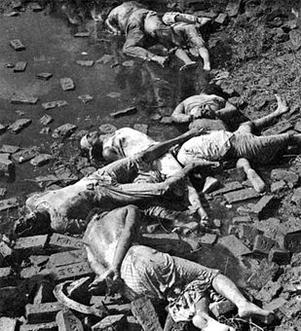Related Research Articles

Genocide is the intentional destruction of a people in whole or in part.

Jammu and Kashmir was a region formerly administered by India as a state from 1952 to 2019, constituting the southern and southeastern portion of the larger Kashmir region, which has been the subject of a dispute between India, Pakistan and China since the mid-20th century. The underlying region of this state were parts of the former princely state of Jammu and Kashmir, whose western districts, now known as Azad Kashmir, and northern territories, now known as Gilgit-Baltistan, are administered by Pakistan. The Aksai Chin region in the east, bordering Tibet, has been under Chinese control since 1962.
The men's rights movement (MRM) is a branch of the men's movement. The MRM in particular consists of a variety of groups and individuals who focus on general social issues and specific government services which they say adversely impact, or in some cases, structurally discriminate against, men and boys. Common topics discussed within the men's rights movement include family law, reproduction, suicides, domestic violence against men, false accusations of rape, circumcision, education, conscription, social safety nets, and health policies. The men's rights movement branched off from the men's liberation movement in the early 1970s, with both groups comprising a part of the larger men's movement.
In scholarly literature and criminology, gang rape, also called serial gang rape, party rape, group rape, or multiple perpetrator rape, is the rape of a single victim by two or more violators. Gang rapes are forged on shared identity, religion, ethnic group, or race. There are multiple motives for serial gang rapes, such as for sexual entitlement, asserting sexual prowess, war, punishment, and, in up to 30% of cases, for targeting racial minorities, religious minorities, or ethnic groups.
Hudud is an Arabic word meaning "borders, boundaries, limits". In the religion of Islam, it refers to punishments that under Islamic law (sharīʿah) are mandated and fixed by God as per Islam. These punishments were applied in pre-modern Islam, and their use in some modern states has been a source of controversy.

The Kashmir conflict is a territorial conflict over the Kashmir region, primarily between India and Pakistan, and also between China and India in the northeastern portion of the region. The conflict started after the partition of India in 1947 as both India and Pakistan claimed the entirety of the former princely state of Jammu and Kashmir. It is a dispute over the region that escalated into three wars between India and Pakistan and several other armed skirmishes. India controls approximately 55% of the land area of the region that includes Jammu, the Kashmir Valley, most of Ladakh, the Siachen Glacier, and 70% of its population; Pakistan controls approximately 30% of the land area that includes Azad Kashmir and Gilgit-Baltistan; and China controls the remaining 15% of the land area that includes the Aksai Chin region, the mostly uninhabited Trans-Karakoram Tract, and part of the Demchok sector.

The Bangladesh genocide was the ethnic cleansing of Bengalis, especially Bengali Hindus, residing in East Pakistan during the Bangladesh Liberation War, perpetrated by the Pakistan Armed Forces and the Razakars. It began on 25 March 1971, as Operation Searchlight was launched by West Pakistan to militarily subdue the Bengali population of East Pakistan; the Bengalis comprised the demographic majority and had been calling for independence from the Pakistani state. Seeking to curtail the Bengali self-determination movement, erstwhile Pakistani president Yahya Khan approved a large-scale military deployment, and in the nine-month-long conflict that ensued, Pakistani soldiers and local pro-Pakistan militias killed between 300,000 and 3,000,000 Bengalis and raped between 200,000 and 400,000 Bengali women in a systematic campaign of mass murder and genocidal sexual violence. In their investigation of the genocide, the Geneva-based International Commission of Jurists concluded that Pakistan's campaign involved the attempt to exterminate or forcibly remove a significant portion of the country's Hindu populace.

The 2002 Gujarat riots, also known as the 2002 Gujarat violence, was a three-day period of inter-communal violence in the western Indian state of Gujarat. The burning of a train in Godhra on 27 February 2002, which caused the deaths of 58 Hindu pilgrims and karsevaks returning from Ayodhya, is cited as having instigated the violence. Following the initial riot incidents, there were further outbreaks of violence in Ahmedabad for three months; statewide, there were further outbreaks of violence against the minority Muslim population of Gujarat for the next year.

Rape during the Bosnian War was a policy of mass systemic violence targeted against women. While men from all ethnic groups committed rape, the vast majority of rapes were perpetrated by Bosnian Serb forces of the Army of the Republika Srpska (VRS) and Serb paramilitary units, who used rape as an instrument of terror and key tactics as part of their programme of ethnic cleansing. Estimates of the number of women raped during the war range between 10,000 and 50,000. Accurate numbers are difficult to establish and it is believed that the number of unreported cases is much higher than reported ones.

Wartime sexual violence is rape or other forms of sexual violence committed by combatants during an armed conflict, war, or military occupation often as spoils of war, but sometimes, particularly in ethnic conflict, the phenomenon has broader sociological motives. Wartime sexual violence may also include gang rape and rape with objects. It is distinguished from sexual harassment, sexual assaults and rape committed amongst troops in military service.
During the 1971 Bangladesh Liberation War, members of the Pakistani military and Razakar paramilitary force raped between 200,000 and 400,000 Bengali women and girls in a systematic campaign of genocidal rape. Most of the rape victims of the Pakistani Army and its allies were Hindu women. Some of these women died in captivity or committed suicide, while others moved from Bangladesh to India. Imams and Muslim religious leaders declared the women "war booty". The activists and leaders of Islamic parties are also accused to be involved in the rapes and abduction of women.
Human rights abuses in Jammu and Kashmir range from mass killings, enforced disappearances, torture, rape and sexual abuse to political repression and suppression of freedom of speech. The Indian Army, Central Reserve Police Force (CRPF), and Border Security Personnel (BSF) have been accused of committing severe human rights abuses against Kashmiri civilians. According to Seema Kazi, militant groups have also been held responsible for similar crimes, but the vast majority of abuses have been perpetrated by the armed forces of the Indian government.
Human rights abuses in Kashmir have been perpetrated by various belligerents in the territories controlled by both India and Pakistan since the two countries' conflict over the region began with their first war in 1947–1948, shortly after the partition of British India. The organized breaches of fundamental human rights in Kashmir are tied to the contested territorial status of the region, over which India and Pakistan have fought multiple wars. More specifically, the issue pertains to abuses committed in Indian-administered Kashmir and in Pakistani-administered Kashmir.
Punishment for rape in Pakistan under the Pakistani laws is either death penalty or imprisonment of between ten and twenty-five years. For cases related to gang rape, the punishment is either death penalty or life imprisonment. DNA test and other scientific evidence are used in prosecuting rape cases in Pakistan.
Rape is the fourth most common crime against women in India. According to the 2021 annual report of the National Crime Records Bureau (NCRB), 31,677 rape cases were registered across the country, or an average of 86 cases daily, a rise from 2020 with 28,046 cases, while in 2019, 32,033 cases were registered. Of the total 31,677 rape cases, 28,147 of the rapes were committed by persons known to the victim. The share of victims who were minors or below 18 – the legal age of consent – stood at 10%.
Domestic violence in Pakistan is an endemic social and public health problem. According to a study carried out in 2009 by Human Rights Watch, it is estimated that between 10 and 20% of women in Pakistan have suffered some form of abuse. Women have reported attacks ranging from physical to psychological and sexual abuse from intimate partners. A survey carried out by the Thomson Reuters Foundation ranked Pakistan as the sixth most dangerous country for women while India ranked 1st as the most dangerous country for women. Given the very few women's shelters in the country, victims have limited ability to escape from violent situations.

Genocidal rape, a form of wartime sexual violence, is the action of a group which has carried out acts of mass rape and gang rapes, against its enemy during wartime as part of a genocidal campaign. During the Armenian Genocide, the Greek genocide, the Assyrian genocide, the second Sino-Japanese war, the Holocaust, the Bangladesh Liberation War, the Bosnian War, the Rwandan genocide, the Congolese conflicts, the South Sudanese Civil War, the Yazidi Genocide, Rohingya genocide, the mass rapes that had been an integral part of those conflicts brought the concept of genocidal rape to international prominence. Although war rape has been a recurrent feature in conflicts throughout human history, it has usually been looked upon as a by-product of conflict and not an integral part of military policy.
During the Sierra Leone Civil War gender specific violence was widespread. Rape, sexual slavery and forced marriages were commonplace during the conflict. It has been estimated by Physicians for Human Rights (PHR) that up to 257,000 women were victims of gender related violence during the war. The majority of assaults were carried out by the Revolutionary United Front (RUF). The Armed Forces Revolutionary Council (AFRC), The Civil Defence Forces (CDF), and the Sierra Leone Army (SLA) have also been implicated in sexual violence.
There have been several instances of religious violence against Muslims since the partition of India in 1947, frequently in the form of violent attacks on Muslims by Hindu nationalist mobs that form a pattern of sporadic sectarian violence between the Hindu and Muslim communities. Over 10,000 people have been killed in Hindu-Muslim communal violence since 1950 in 6,933 instances of communal violence between 1954 and 1982.
The Kashmir conflict has been beset by large scale usage of sexual violence by multiple belligerents since its inception.
References
- ↑ Mohiuddin, Yasmeen Niaz (2006). Pakistan: A Global Studies Handbook (1st ed.). ABC-CLIO. p. 355. ISBN 978-1851098019.
- ↑ Khalid, R. (2011). Alexandra Rutherford; Rose Capdevila; Vindhya Undurti; Ingrid Palmary (eds.). Handbook of International Feminisms: Perspectives on Psychology, Women, Culture, and Rights (1st ed.). Springer. p. 136. ISBN 978-1441998682.
- ↑ Suhail, Kausar; M. Asir Ajmal (2009). Lawrence H. Gerstein; Seung-Ming Alvin Leung; Kathryn L. Norsworthy; P. Paul Heppner (eds.). International Handbook of Cross-Cultural Counseling: Cultural Assumptions and Practices Worldwide (1st ed.). Sage. p. 246. ISBN 978-1441998682.
- ↑ Staff (20 March 2008). "Rape case muddied by claims of 3 parties". Daily Times. Lahore. Archived from the original on 19 June 2013. Retrieved 17 June 2013.